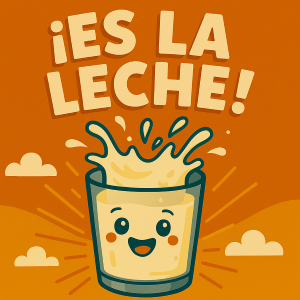Hola Nan
Gracias por tu comentario.
El equivalente de "Es la leche" en México podría ser "Es la neta" "Está chido" "Está padrísimo → It’s cool / really great.
Si conoces una expresión interesante de México, puedes hacer sugerencias. :))
Saludos,
Inma

Ser la leche – The wild versatility of a Spanish expression
The Spanish idiom ser la leche is one of those phrases that can throw learners off. Literally translated, it means “to be the milk”, which doesn’t make much sense in English. But in Spanish, this expression packs a punch, and depending on how it’s used, it can mean something great, awful, impressive, annoying, or surprising.
So, what does it mean?
The meaning of ser la leche depends entirely on context and tone. It’s a colloquial expression widely used in Spain (less so in Latin America), and can have both positive and negative connotations.
✅ Positive Use: ser la leche = to be amazing / awesome
When used in a positive way, it means someone or something is really cool, impressive, or exceptional.
For example:
Ese tío es la leche.
That guy is awesome.
Este móvil es la leche, tiene de todo.
This phone is amazing, it has everything.
This usage is similar to saying “the bomb” in English slang.
❌ Negative Use: ser la leche = to be annoying / too much / outrageous
On the flip side, it can also express disbelief, annoyance, or frustration—kind of like saying “unbelievable” in a bad way.
For example:
Eres la leche, siempre llegas tarde.
You’re unbelievable, always showing up late.
¡Es la leche lo que ha hecho!
What he did is outrageous!
In these cases, the speaker is not impressed, they’re annoyed or surprised in a bad way.
🤔 Where did this come from?
The origin of ser la leche is unclear, but there are a few theories:
Some believe it ties back to the strong emotional reactions associated with milk, whether as a nurturing symbol (mother’s milk) or a shocking one (e.g., sour milk).
Others think it’s just part of a broader Spanish habit of using bodily fluids or food in idioms (me cago en…, tener mala leche, etc.).
In older Spanish, leche was sometimes used in expressions to mean force, energy, or impact, which might explain the wild range of meanings.
There’s no consensus, but what’s clear is that leche has long carried emotional weight in everyday speech.
🧠 Tips for using ser la leche
Context is everything. Listen to the speaker’s tone to figure out if it’s praise or criticism.
It’s very informal, so use it with friends or in casual conversation, not in formal writing or professional settings.
You’ll hear it a lot in Spain, especially among younger people or in humorous or dramatic storytelling.
Variations to watch for
Tener mala leche = to be in a bad mood / to have a mean streak.
Cuidado con ella, tiene mala leche. → Watch out, she’s nasty.)
¡La leche! on its own = can express surprise or frustration.
¡La leche, se me olvidó el examen!
Damn, I forgot the exam!
Bottom line: Ser la leche is a wild card, it can be a compliment, a complaint, or a way to vent. Like a lot of great slang, its power comes from how you say it, not just what you say.
Use in Latin America?
In Latin America, and Mexico in particular, ser la leche is not commonly used. It’s a very Spain-specific expression. While people might understand it, especially if they’ve been exposed to Spanish media, it doesn’t form part of everyday speech in most Latin American countries.
In Mexico, if you said Eres la leche to a Mexican, they might be confused or think you’re literally talking about milk. Instead, Mexicans are more likely to use expressions like: Eres la neta → You’re awesome / the real deal. Está chido / padrísimo → It’s cool / really great. No manches → No way / You’re kidding / That’s crazy (context-dependent).
Estudio español de México, no de España; pero, esta idioma es muy interesante! Que lástima que no puedo usarla!